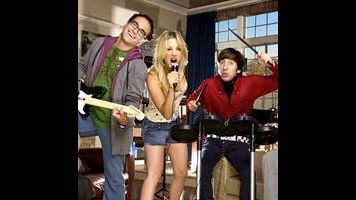Such was sadly not the case with tonight's episode of The Big Bang Theory – although I don't think my dislike of the episode had anything to do with the recorded laughter. In fact, in structural terms, one of the things I liked the most about the show was its use of the live reaction shot. Most of the moments that I found the funniest moments didn't come from the writing of the episode, but instead came from the characters' physical comedy, based around extending the laughter after a good joke. These characters, the alien nerds, became sympathetic by responding in conventional fashion to other people altering their lives.
This was necessary, because with one exception, I found the characters to be utterly unsympathetic. From what I gather from other TV critic chatter, Sheldon has become the breakout character, turning it into his show from what had initially been an ensemble. I suppose that, at a conceptual level, I can understand Sheldon's appeal, but he just feels too easy to me. He's a geek with Aspberger's or something similar. He likes rules and references and doesn't do things that TV generally considers “fun.” From this, humor is derived. Thing is, I'm not sure that anything he actually said, before the end of the episode, actually made me laugh. I acknowledge that he's the kind of character from which the comedy springs forth, but it still didn't work for me. He is the prototype of the male nerd; he is the nerds from “Homer Goes To College” given flesh. But that doesn't seem real to me. I mean, I know Star Trek nerds. I know people with Aspberger's, or at least, people who seem like they're ideal for diagnosis. Sheldon – and to a slightly lesser extent, Leonard – seem like stereotypes more than real people.
I'm used to this on television, but ever since watching Freaks & Geeks, I wonder why. The “Geeks” on that show seemed like actual people. They really liked Star Wars, not just because it was a qualification of geekery that needed to be checked off. Spaced has other examples of the functional, human geek. They like their science fiction, yes. They know it and love it and cite it, true. But they're still fundamentally human. Is that true of the characters on The Big Bang Theory? After an episode, I'm pretty unsure, with the one exception I mentioned earlier.
That exception is Amy, who cursory research reveals to be both a non-main-cast character, as well as Blossom, the latter of which illustrates why she's an effective sitcom actor. Amy is the only aspect of the episode that I liked without any qualification. She's a nerd, yes, but she's a nerd who doesn't immediately fall into the typically masculine categories defined by superheroes or Star Trek or what-have-you. It comes through the most when Sheldon is taken on a girl's night out. The other girls are Penny, who's portrayed as a typical TV female cast member – though the actress does get some good physical comedy in – and Bernadette, who seems drawn from a stock of “cute sitcom characters who said weird things in funny voices” that does nothing for me. Amy, on the other hand, gets actual lines befitting a nerdy character, like “Things get c-RAZY” while sipping a very girly drink. Most of the jokes in the show seem to be clearly labeled “This is something a nerd would say!” or in Priya's case, “This is something a lawyer would say!” Amy's best moments, on the other hand, seem more like “This is something that this particular character might say.” She demonstrated depth, an actual person underneath the Nerdy Girl exterior. I didn't get that from anyone else. And discovering that she's not even a regular character makes me much less likely to keep up with the show.
Stray Observations and Moderately Funny Lines:
- Not a fan of the theme song either, and definitely not a fan of the bizarre visual segués between scenes. But I have to admit that I like that it doesn't pretend the universe began 6,000 years ago.
- “To wit: my back teeth were floating.”
- The show kept telling me to hate Priya. But I really didn't. She took an asshole document from Sheldon and flipped it on him. The ending felt forced, and I suppose was intended to make me dislike her, but I wasn't really on anyone's side by then.
- “You're like a sexy toddler.”
- “If you're referring to the hat you wear while holding a candle, I already have one.”
- “…I set your oven to the correct time because it was driving me crazy….”


 Keep scrolling for more great stories from A.V. Club.
Keep scrolling for more great stories from A.V. Club.